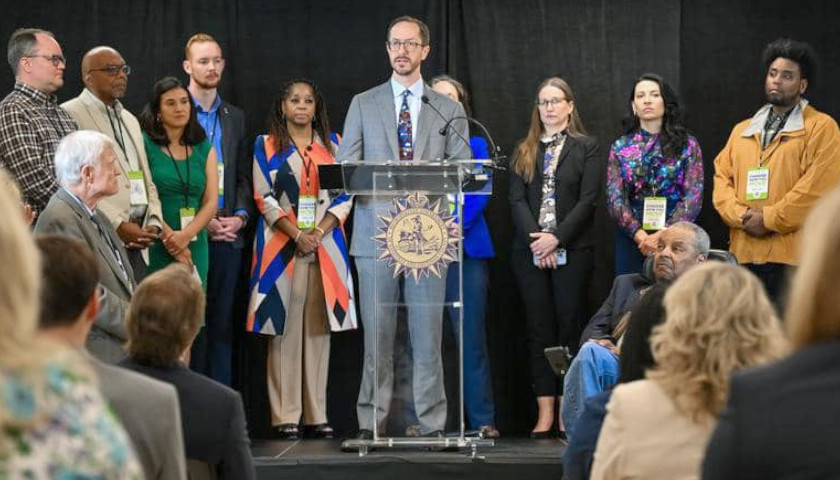In his testimony before the Davidson County Election Commission’s September 25 meeting, Metro Legal Director Bob Cooper cited a 1949 Tennessee Supreme Court decision, Cummings v. Beeler, as a “template” the commission could follow if it chose to accept a third option he outlined as a possible course of action – to “file a lawsuit in Davidson County Chancery Court seeking a declaratory judgment on whether the amendment should be placed on the ballot or should be rejected.”
Cooper stated the Cummings v. Beeler case was about “whether it [The Tennessee Secretary of State’s Office] could hold a statewide referendum election where the constitutionality of the referendum was in question.”
The Tennessee Star has obtained a copy of the Tennessee Supreme Court’s ruling in that case, which can be read in this story below. Cummings was the Tennessee Secretary of State at the time, and the plaintiff in the lawsuit. Beeler was the Tennessee Attorney General at the time and one of the defendants in the lawsuit. Another defendant was the Davidson County Election Commission.
“The purpose of the suit was to have the Court declare the rights, status, duties and obligations and other legal relations of the parties as affected by Chapter 49 of the Public Acts of 1949. The bill further averred that the Statute is constitutional and asked that the Court so declare,” the Tennessee Supreme Court said in its 1949 decision, adding:
The Election Commissioners, who are parties defendant to this suit have certain specific duties to perform under the Act. They allege in their answer that there are serious doubts as to the validity of Chapter 49 of the Public Acts of 1949 and that these doubts were greatly strengthened by the published opinion of the Attorney General of Tennessee, rendered prior to the passage of the Act in question. It seems to us that the question is not merely a theoretical question. We have an Act of the legislature mandatorily requiring a State official to spend public funds to hold a special election on November 8, 1949.
The Secretary of State is required to spend this State money. He must either obey the mandatory provisions of this law which the Attorney General has previously publicly declared as unconstitutional or he must disregard the law entirely. If the Secretary of State decides to follow the mandates of the statute and spend the public funds and then it develops that the Attorney General was correct in his opinion in holding that the law was invalid and unconstitutional, the Secretary of State would have spent public funds under the authority of a law which was illegal and without effect. This expenditure would have been made in face of the declared official opinion of his official legal adviser that the law was invalid and unconstitutional. It would therefore clearly appear that the Secretary of State has a real interest, officially, in determining whether or not the legislation is valid before spending these public funds.
Based on this opinion, it appears that Cummings v. Beeler was not about the constitutionality of a statewide referendum, but was instead about the constitutionality of the state law that provided for a statewide referendum to determine election questions.
The court ruled in that 1949 case that the state law was, in fact, constitutional.
The Star asked Metro Legal Director Cooper to comment on our reading of the 1949 Cummings v. Beeler case–that it was not about the constitutionality of a statewide referendum, but was instead about the constitutionality of the state law that provided for a statewide referendum to determine election questions–but did not receive a response yet.
As The Star reported on September 26, the Davidson County Election Commission listened to Bob Cooper’s advice and voted three to two not to schedule a date for a county wide referendum on the Nashville Taxpayers Protection Act, which would, among other things, repeal the recently enacted 34 percent property tax increase and instead hire an attorney to prepare a legal challenge on the constitutionality of the referendum, the third option outlined by Cooper.
“The Davidson County Election Commission has recruited a legal team to sue the citizens’ group Americans for Prosperity-Tennessee (AFP-TN) for its December ballot tax cut petition. Former Tennessee Supreme Court Justice Bill Koch will serve as lead counsel, and Junaid Odubeko the co-counsel,” The Star reported last Monday:
AFP-TN, along with other small citizen groups, immediately began collecting signatures after Cooper’s proposal to petition that the city put their tax increase to a vote. Metro’s Director of Law Robert Cooper Jr. issued a legal opinion on Monday calling the amendment “unconstitutional” and “unlawful.”
“No, the proposed charter amendment is not legal and enforceable. It is defective in form and conflicts with the Tennessee Constitution and state and local law in the [various] ways,” he said. . .
The commission plans to meet Tuesday, October 6 at 3 p.m. EDT.
Here is the transcript of Metro Nashville Legal Director Bob Cooper’s testimony before the Davidson County Election Commission at its September 25 meeting.
Reynolds: On today’s agenda we have two items pertaining to two charter amendment referendums. The referendum based on the 4 Good Government petition and the referendum based on the Metro Council substitute resolution RS- 2020:480. Let’s turn first for discussion and action on the charter amendment referendum based on the 4 Good Government petition. And with that, I would first like to call on our Administrator of Elections Jeff Roberts to give the commission the procedural background on the petition. Please, sir.
Jeff Roberts: Yes ma’am. Included in your packet is the certifications that we provided to the clerk concerning the petitions themselves. Our initial look through the petitions discovered that we had seven different formats for the petition. One of those formats had a different language than the other six. so those petitions we set aside and only verified the signatures on the petitions that had the referendum stated in exactly the same language. So those different formats were sent to the Clerk. The Clerk responded back with the letter that you see in your packet and put us in the position of where we are today.
Reynolds: Thank you. Thank you, Mr. Roberts. Are there any questions from the commissioners? All right thank you. Now we’ll proceed to our discussion and determination of whether to hold a referendum election on the petitions charter amendment consistent with our responsibility in the metro charter and with state law.
Just as a side note, of course, the commission’s responsibility, and we’re all fully aware of this is not to be here to determine whether amendments are good or bad policy or debate our personal feelings on the amendment or the merits of the position. Metro legal has provided legal information to the commission in the course of this process. Metro’s law director Bob Cooper will review with the commission what our options are regarding the 4 Good Government petition. Mr. Cooper the floor is yours.
Metro Legal Director Bob Cooper: Thank you madam chair. The chair has asked me to review the commission’s options with regard to the 4 Good Government’s petition charter amendment that has been submitted. First a few words about the scope of the commission’s authority. The commission’s role here is not purely ministerial. The commission has the authority to review the legal sufficiency of a referendum petition. In 2004 the Tennessee Supreme Court held that a county election commission has limited discretion.
The court said that the commission can consider the form of a referendum petition and suggested it could review the petition’s facial or procedural legality.
This holding was affirmed in 2017 when the Tennessee Supreme Court said that election commissions “are not strictly ministerial bodies” and that “the election code clearly gives the county election commissions the authority to perform functions that are discretionary in addition to their ministerial duties.”
Now within this scope, the commission has three options with respect to the petition in front of you.
First, the commission could decide to accept the petition and place the referendum on the ballot. This would not be an endorsement of the amendment. It would be a decision that the commission does not have the authority to consider any defects in the amendment.
Or that the commission does not consider any defects sufficiently serious to prevent the referendum from proceeding.
Second, the commission could decide to reject the petition and decline to hold a referendum on the amendment. This would be a decision that the amendment is disqualified from the ballot by one or more defects in form or by facial or procedural illegalities.
Third, the commission could file a lawsuit in Davidson County Chancery Court seeking a declaratory judgment on whether the amendment should be placed on the ballot or should be rejected. The 1949 Tennessee Supreme Court opinion in Cummings v. Beeler provides a template for this third option. That lawsuit was brought by the Tennessee Secretary of State asking the court whether it could hold a statewide referendum election where the constitutionality of the referendum was in question.
Similar to Cummings, a declaratory judgment lawsuit by the commission here would assert that the commission has a significant interest in executing its legal duty to hold a special election. The lawsuit could also assert that the commission is seeking an authoritative court ruling on potential defects in the petition before incurring the significant and possibly unnecessary expense of holding a special election. (emphasis added)
[You can read the 1949 Tennessee Supreme Court decision in Cummings v. Beeler here:]
The lawsuit would name Metro officials and the 4 Good Government petitioners as defendants. Those parties would then litigate over the legal sufficiency of the petition. If the commission chooses this third option I would stress the need to expedite the proceedings toward a swift resolution. Those are the three options before the commission. I’m happy to answer any questions.
Reynolds: Thank you, Director Cooper. Any questions for Metro legal? Hearing none, then commissioners we will move forward with our discussion of the petition and the amendment. I do want to pose a question of you all here and see if we might have a consensus. We have five individuals signed up to speak. I assume it’s all regarding this matter. If not I’ll trust you folks who signed up to let me know. In the past we have taken public comments prior to our discussion and prior to any decision. Is there any agreement that the procedure has served us well and might do so again today?
Woman Commissioner: I’m in agreement on that.
You can watch the full September 25 meeting of the Davidson County Election Commission here:









is this dud any kin to the mayor?